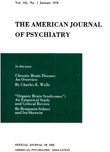Faculty Response to Student Confrontation
Abstract
A psychiatric faculty was confronted with the need for change by discontented first-year medical students. A description of the events and some of the factors involved in the faculty response to the student demands is presented. There were a number of irrational and emotional factors influencing faculty attitudes; these variously reinforced prior tendencies in favor of or against change. Recognition of these irrational tendencies is essential if we are to prevent polarization and promote cooperation and problem solving.
Access content
To read the fulltext, please use one of the options below to sign in or purchase access.- Personal login
- Institutional Login
- Sign in via OpenAthens
- Register for access
-
Please login/register if you wish to pair your device and check access availability.
Not a subscriber?
PsychiatryOnline subscription options offer access to the DSM-5 library, books, journals, CME, and patient resources. This all-in-one virtual library provides psychiatrists and mental health professionals with key resources for diagnosis, treatment, research, and professional development.
Need more help? PsychiatryOnline Customer Service may be reached by emailing [email protected] or by calling 800-368-5777 (in the U.S.) or 703-907-7322 (outside the U.S.).



